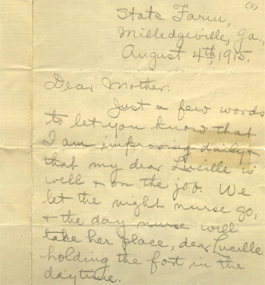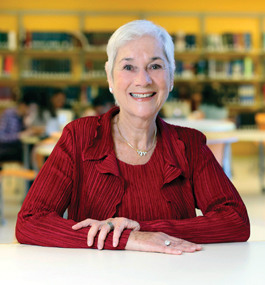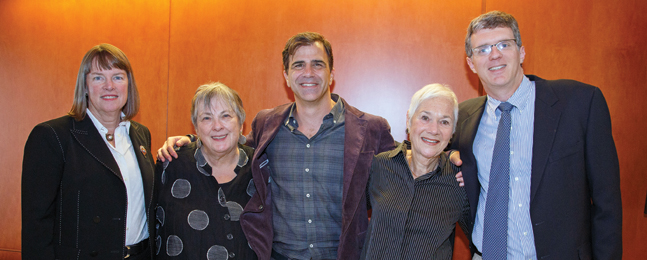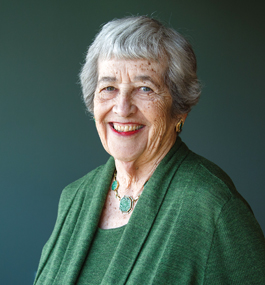Imprint

Detail of a letter Leo Frank wrote to his mother from prison on Aug. 4, 1915.
A New Kind of Library
To create what it calls “the library of the future,” the Brandeis National Committee this fall launched a $500,000 campaign to digitize thousands of materials in Brandeis’ Robert D. Farber University Archives and Special Collections, enabling scholars worldwide to access unique collections with the click of a mouse.
The Honoring Our History campaign represents a return to its roots for the BNC, founded in 1948 — the same year as the university — with a mission of helping Brandeis build a library.
“For 72 years, whenever and wherever we’ve been asked to help the university, the BNC has always been there,” says executive director Beth Bernstein, MA’90. “We are excited now to be creating the library of the future.”
The collections selected for the campaign focus on such themes as the Jewish experience, immigration and resistance to persecution, says Sarah Shoemaker, associate university librarian for archives and special collections. Some of the collections to be digitized are:
• The Leo Frank Trial Collection, which documents a notorious murder trial. Frank, the Jewish superintendent of an Atlanta pencil factory, was convicted in 1913 of murdering a 13-year-old girl found dead at the factory. The trial sparked a sensation, marked by overtones of antisemitism. After Georgia’s governor commuted Frank’s death sentence, Frank was abducted from jail and lynched. Materials in the Brandeis collection came from Frank’s widow, a member of the BNC’s Atlanta Chapter during the 1950s.
• The Jewish Resistance Collection, containing underground publications created by German communist and French Jewish resisters to the Nazi regime before and during World War II.
• Collections related to Jewish feminism, including manuscripts and correspondence from Lilith magazine (co-founded in 1976 by Susan Weidman Schneider ’65, who still serves as editor-in-chief).
• The Brandeis University Photography Collection, with more than 100,000 negatives taken over the institution’s history. Digitization will capture and restore deteriorating acetate negatives before the images are lost.
Providing electronic access to these materials will invite new forms of digital scholarship and ensure global access to Brandeis’ one-of-a-kind research collections, Shoemaker says.
According to Matthew Sheehy, Brandeis’ university librarian, the process of digitization entails more than simply photographing an object so it can be shared online. The material is imaged and also enhanced with metadata.
Sheehy hopes the campaign will pave the way for more of the library’s extensive holdings to be put online.
“It’s now a virtual library,” he says. “In essence, a library on your desktop.”
To support the Honoring Our History campaign, go to giving.brandeis.edu/honoringourhistory.

Madalyn Friedberg
Message From the BNC President
I often think about this Louis Brandeis quote: “Most of the things worth doing in the world had been declared impossible before they were done.”
The Brandeis National Committee has existed to support Brandeis University since 1948. In particular, the BNC has a unique relationship with the university’s library. We helped put its first books on its shelves — and its millionth.
We are proud to continue supporting the library through Honoring Our History, our new campaign to digitize the archives’ special collections.
Digitization is the future of libraries. The ability to access primary source materials online is a critical aid for scholars everywhere. Our campaign will invite new forms of digital scholarship and will make Brandeis’ special collections — including papers, publications, correspondence and photos that speak to the struggle for social justice — available to innumerable researchers and students around the world.
When the university and the BNC were founded, being able to share with the world the depth of knowledge housed in the Brandeis Library would have seemed inconceivable.
With your support, the Honoring Our History campaign will make the impossible possible.
Warmly,
Madalyn Friedberg
Brain Trust

Provost Lisa Lynch; Beth Bernstein, MA’90, executive director of the BNC; Josh Trachtenberg ’90; Madalyn Friedberg, BNC national president; and Steve Van Hooser, associate professor of biology at Brandeis, celebrate the successful completion of the BNC’s Magnify the Mind campaign, which purchased a two-photon resonance microscope that captures brain activity in real time. Trachtenberg, professor of neurobiology at UCLA, founded the company that created the rare microscope.

Carol Singer Rabinovitz ’59, G’18
‘Brandeis Is in My Blood’
When Carol Singer Rabinovitz ’59, G’18, walks through the Brandeis Library, she finds herself contemplating the little plaques on the stacks that recognize library donors. “They’re all people I knew,” she says. “It’s like visiting with my friends.”
When Rabinovitz arrived on campus as a student in 1957, the library, housed in a former stable, had only 2,000 volumes. Her first job after graduation was working as a receptionist in the Boston office of the Brandeis University National Women’s Committee — today known as the Brandeis National Committee — formed to raise money for the library. Years later, Rabinovitz led the campaign that brought the library its one-millionth volume and created a $500,000 endowment for American Judaica materials.
“Brandeis is in my blood — always will be,” she says.
Rabinovitz has dedicated much of her life to advancing Brandeis, as the executive director of the BNC, president of the Boston Alumni Club and the university’s executive director of development, among other roles.
While managing the BNC office as an unpaid volunteer in 1980, she was invited to become the BNC’s full-time executive director, a role that oversaw 126 chapters around the country and raised more than $3 million a year. That led to her being named Brandeis’ executive director of development, a role in which she laid the groundwork for a $200 million fundraising drive, the university’s first capital campaign.
“What I’m good at is managing things,” Rabinovitz says. “If we’re here and we need to get here, I can always see the steps to take us there.”
Today, she and husband Mayer “Mickey” Rabinovitz, an attorney, are grandparents of four. Her first grandson was born in 1996, the same year she presented the Brandeis Library with its millionth book. That grandson, Louis Rabinovitz ’18, graduated from Brandeis 59 years after she received her diploma.
Rabinovitz remains especially proud of having chaired the BNC’s Sustaining the Mind campaign, which raised $3 million for research into neurodegenerative diseases. Her own mother, Esther, had Alzheimer’s disease.
Her hope for Brandeis in the future?
“I’d like to see it filled with wonderful, smart kids studying to improve the world,” she says. “It’s such a fine institution. I’ll raise money for Brandeis for as long as I can.”
— Mark Sullivan
